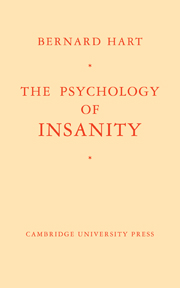Book contents
- Frontmatter
- Prefaces
- Contents
- Introduction to Fifth Edition
- Chapter I THE HISTORY OF MENTAL DISORDER
- Chapter II THE PSYCHOLOGICAL CONCEPTION OF MENTAL DISORDER
- Chapter III THE PHENOMENA OF MENTAL DISORDER
- Chapter IV DISSOCIATION
- Chapter V COMPLEXES
- Chapter VI CONFLICT
- Chapter VII REPRESSION
- Chapter VIII MANIFESTATIONS OF REPRESSED COMPLEXES
- Chapter IX PROJECTION
- Chapter X THE IRRATIONALITY OF THE INSANE
- Chapter XI PHANTASY
- Chapter XII THE SIGNIFICANCE OF CONFLICT
- Index
Chapter XII - THE SIGNIFICANCE OF CONFLICT
Published online by Cambridge University Press: 04 August 2010
- Frontmatter
- Prefaces
- Contents
- Introduction to Fifth Edition
- Chapter I THE HISTORY OF MENTAL DISORDER
- Chapter II THE PSYCHOLOGICAL CONCEPTION OF MENTAL DISORDER
- Chapter III THE PHENOMENA OF MENTAL DISORDER
- Chapter IV DISSOCIATION
- Chapter V COMPLEXES
- Chapter VI CONFLICT
- Chapter VII REPRESSION
- Chapter VIII MANIFESTATIONS OF REPRESSED COMPLEXES
- Chapter IX PROJECTION
- Chapter X THE IRRATIONALITY OF THE INSANE
- Chapter XI PHANTASY
- Chapter XII THE SIGNIFICANCE OF CONFLICT
- Index
Summary
If we now review the field which we have surveyed in the present volume, and consider the implements which have proved of value in the investigation of its details, we shall at once observe that there are two of those implements which have been pressed into service at almost every turn. These are the conceptions of dissociation and conflict, and their utility has been so great that it will be profitable to examine from a more comprehensive and general point of view the part which they play in mental life.
We have seen that a vast number of abnormal phenomena, ranging from hallucinations and delusions to the complicated phantasy productions described in the last chapter, are to be regarded as examples of dissociation. The mind has lost that homogeneity which is the ideal of the normal personality, and has become disintegrated into more or less independent portions, each pursuing its own course and development without reference to the welfare of the whole.
We have seen, moreover, that this disintegration has invariably owed its existence to the presence of a conflict. Homogeneity has disappeared because the mind contains elements which are incompatible with each other, and dissociation has arisen as a method of avoiding the storm and stress which the warring of these mutually hostile elements would otherwise inevitably produce. Dissociation is therefore to be regarded biologically as a refuge from the stress of conflict, and as one of nature's methods of dealing with conflicts which seem insoluble by other means.
- Type
- Chapter
- Information
- The Psychology of Insanity , pp. 119 - 124Publisher: Cambridge University PressPrint publication year: 1957



